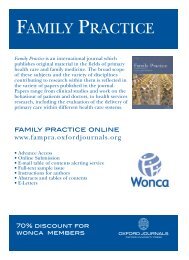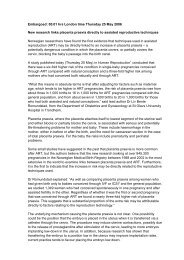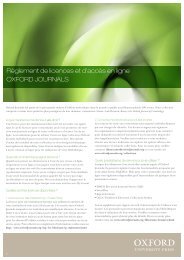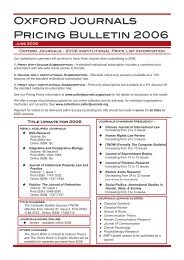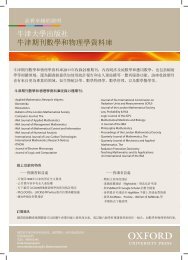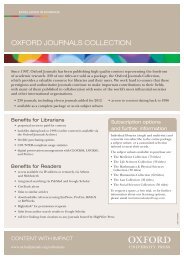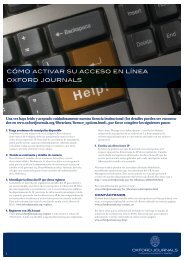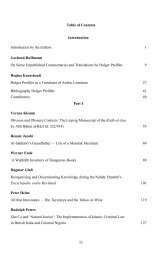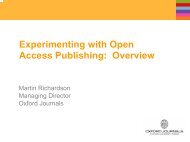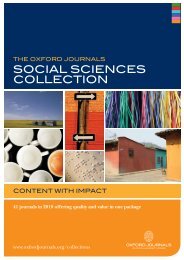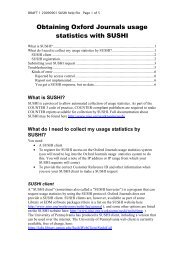Download the ESMO 2012 Abstract Book - Oxford Journals
Download the ESMO 2012 Abstract Book - Oxford Journals
Download the ESMO 2012 Abstract Book - Oxford Journals
Create successful ePaper yourself
Turn your PDF publications into a flip-book with our unique Google optimized e-Paper software.
events, tumour response, and survival would be desired by 100%, 97%, and 80% of<br />
patients. The information on <strong>the</strong>se items in <strong>the</strong> decision aid was desired by 95%,<br />
91%, and 74% of patients. The question of whe<strong>the</strong>r <strong>the</strong> doctor had disclosed <strong>the</strong><br />
information was answered positively by 72%, 53%, and 28% of patients. Results of<br />
<strong>the</strong> association between patient’s information desire and demographic, clinical, and<br />
psychological measures will be presented.<br />
Conclusions: Even in this advanced setting, most patients accepted all information<br />
in <strong>the</strong> decision aid. Patients perceived that <strong>the</strong> oncologists had not disclosed all<br />
desired information. While oncologists accurately judged that patients in this study<br />
had a high information desire, <strong>the</strong>ir judgment of information desire on tumour<br />
response and survival for an individual patient was no better than could be expected<br />
by chance. These results demonstrate <strong>the</strong> importance of ascertaining a patient’s<br />
information desire, and communicating more candid, especially on survival.<br />
Disclosure: All authors have declared no conflicts of interest.<br />
1470P FAMILY CAREGIVER BURDEN: RESULTS OF A MOROCCAN<br />
PROSPECTIVE STUDY OF CANCER IN THE ELDERLY AND<br />
THEIR CAREGIVERS<br />
S. Lkhoyaali 1 , M. Ait El Haj 2 , S. Raissouni 3 , G. Rais 1 , H. Mrabti 3 and H. Errihani 3<br />
1 Medical Oncology, National Institut of Oncology, Rabat, MOROCCO, 2 National<br />
Institute of Oncology, INO, Rabat, MOROCCO, 3 Medical Oncology, Institut<br />
National d’Oncologie Sidi Mohamed Ben Abdellah, Rabat, MOROCCO<br />
Introduction: The support of older patients affected with cancer by <strong>the</strong>ir natural<br />
caregivers is not a simple task. It could be a painful experience with a major<br />
emotional, physical and economic impact on relatives. Usually family members do<br />
that task and <strong>the</strong>y may not be prepared for <strong>the</strong> challenges. The needs of older<br />
patients are diverse and may include assistance with medication, transportation for<br />
treatment, and emotional support.<br />
Methods: This is a prospective descriptive study, conducted in <strong>the</strong> National Institute<br />
of Oncology in Rabat during a ten month period from December 2010 to September<br />
2011.We included relatives of patients aged 70 or older with histologically proven<br />
cancer and also <strong>the</strong>ir relatives. A questionnaire was given to participants. For all<br />
participants, demographics, disease characteristics, social, economical and<br />
psychological features were recorded. Psychological impact was assessed using<br />
DSM-IV.<br />
Findings: A total of 150 patients’ relative caregivers responded to <strong>the</strong> questionnaire.<br />
Mean age was 44.7 years old. More than two thirds live in urban areas and educated in<br />
62.7%. They were 56.7% sons or daughters, living with <strong>the</strong>ir relatives in 54% of cases.<br />
Most of participants were married and have familial responsibilities. In relatives,<br />
anxiety was found in 79.3%. It was related to fear of losing <strong>the</strong> patient in 57% and led<br />
to <strong>the</strong> use of anxiolytics in 10%. Guilty feelings toward patients regarding neglecting<br />
early symptoms was reported in 38% of <strong>the</strong> relatives. Depression and anxiety were<br />
more frequent among female relatives and in those of urban origin. Obsession with<br />
dying from cancer was present in about 30% and fear of contagion was more common<br />
among those from rural backgrounds and <strong>the</strong> illiterate. Economic resources were<br />
exceeded in 78.7%, and 56% have used credit, sale of properties and work lay-off was<br />
recorded in 54%. Relatives participated in treatment making decisions in 86%.<br />
Conclusion: Even where <strong>the</strong>re was a great impact on older cancer patients’ relatives,<br />
<strong>the</strong> benefits of caregiving was observed in 80% in our study, <strong>the</strong>se included greater<br />
self-esteem, personal growth, meaning and purpose in one’s life, and gratitude for<br />
being able to reciprocate care. Assistance and information from healthcare<br />
professionals remains <strong>the</strong> key to improving <strong>the</strong> ability of caregivers to cope with<br />
caring for older patients with cancer.<br />
Disclosure: All authors have declared no conflicts of interest.<br />
1471P ANNOUNCING CANCER IN A DEVELOPING COUNTRY: HOW<br />
IS IT DIFFERENT?<br />
R. Belbaraka 1 , A. Mahfoudi 1 , M. Khouchani 2 and A. Tahri 2<br />
1 Centre Oncologie Hematologie, Cadi Ayad University, Marrakech, MOROCCO,<br />
2 CHU, Mohamed Vi, University Cadi Ayyad, Marrakech, MOROCCO<br />
Background: Announcing a cancer diagnosis, but also a relapse, a progression of <strong>the</strong><br />
disease, or transition towards palliative care constitute particularly difficult<br />
communication issues for <strong>the</strong> patient as well as for <strong>the</strong> clinician, during <strong>the</strong><br />
trajectory of care. The study aimed to describe <strong>the</strong> difficulties in establishing a<br />
“good” announcing consultation, to provide indications or even recommendations on<br />
<strong>the</strong> ways to facilitate communication in order to ensure a optimal quality of care,<br />
responding to patients needs and ensuring <strong>the</strong> continuity of <strong>the</strong> care.<br />
Patients and methods: A semi-directive questionnaire with 21 items in Arabic were<br />
conducted in patients with cancer to evaluate <strong>the</strong>ir perception of <strong>the</strong> announcement<br />
of cancer.<br />
Results: 189 patients aged 18-78 years participated in <strong>the</strong> questionnaire. Participation<br />
was on a voluntary basis and patients were informed <strong>the</strong>y could be accompanied by<br />
an outside person if <strong>the</strong>y wished. The analysis revealed that several factors<br />
determined <strong>the</strong> quality of <strong>the</strong> relation as perceived by <strong>the</strong> patient receiving <strong>the</strong><br />
Annals of Oncology<br />
announcement of cancer: <strong>the</strong> relationship between <strong>the</strong> patient and <strong>the</strong> physician<br />
prior to <strong>the</strong> announcement, <strong>the</strong> practitioner’s consideration of <strong>the</strong> role of o<strong>the</strong>rs<br />
(family, friends) close to <strong>the</strong> patient, <strong>the</strong> practitioner’s respect of <strong>the</strong> patient’s desire<br />
for information, and <strong>the</strong> modalities of <strong>the</strong> announcement. Modalities considered to<br />
be favorable were: <strong>the</strong> physician’s empathy and availability, a progressive<br />
announcement using clear terms, presence of family or friends at <strong>the</strong> time of <strong>the</strong><br />
announcement if desired by <strong>the</strong> patient, absence of half-truths or lies.<br />
Conclusion: Announcing a diagnosis of cancer is a major challenge to <strong>the</strong><br />
physician’s technical competence and human qualities. This is probably one of <strong>the</strong><br />
greatest challenges that we have to face in oncology. This work confirmed that better<br />
knowledge of <strong>the</strong> patient’s experience is useful for examining our practices for<br />
announcing <strong>the</strong> diagnosis of cancer.<br />
Disclosure: All authors have declared no conflicts of interest.<br />
1472P WHAT MOROCCAN CANCER ELDERLY PATIENTS WANT<br />
TO KNOW<br />
S. Raissouni 1 , S. Lkoyaali 1 , G. Rais 1 , M. Aitelhaj 2 , H. Mouzount 2 , H. Mrabti 1 and<br />
H. Errihani 1<br />
1 Medical Oncology, National Institute of Oncology, Rabat, MOROCCO, 2 Medical<br />
Oncology, INO, Rabat, MOROCCO<br />
Introduction: Announcing cancer to a patient is not a simple task. Usually doctors<br />
fail to inform patients about this diagnosis and this is still more likely in older<br />
people. The need of information in elderly cancer patients is not well established. In<br />
developed countries <strong>the</strong> majority of old patients demand exhaustive information<br />
about <strong>the</strong>ir disease. However in developing countries where social and cultural issues<br />
are different, perception of cancer in <strong>the</strong> elderly is not well studied. Therefore we<br />
conducted a prospective study on <strong>the</strong> needs of elderly Moroccan cancer patients for<br />
information about <strong>the</strong>ir disease.<br />
Methods: This was a prospective descriptive study, conducted in <strong>the</strong> National<br />
Institute of Oncology of Morocco (December 2010-September 2011). Cancer patients<br />
older than 70 were included. A questionnaire was given to participants.<br />
Demographics, disease characteristics, social and economic features were recorded.<br />
Informed consent was required.<br />
Results: 150 patients responded to <strong>the</strong> questionnaire. Mean age was 73. Men to<br />
woman sex-ratio 0.85. 72.7% of patients were diagnosed in advanced stages. Illiteracy<br />
was found in 76%. 87.3% of patients did not have health insurance. All patients were<br />
Muslim, practicing in 97%. 57% ignored diagnosis. 80% didn’t want to know fur<strong>the</strong>r<br />
information about prognosis and treatment side effects. Family protection from<br />
information was found in 70%.<br />
Conclusion: Elderly Moroccans affected with cancer are less demanding of details<br />
about <strong>the</strong>ir illness. Illiteracy and cultural background may play major roles in this.<br />
Protection by relatives is also an influence. Comparative studies with young patients<br />
are needed.<br />
Disclosure: All authors have declared no conflicts of interest.<br />
1473P PATIENT PREFERENCE, ADHERENCE AND OUTCOMES<br />
IN ONCOLOGY: DEVELOPMENT OF A THEORETICAL MODEL<br />
S.L. Shingler 1 , B. Bennett 1 , J. Cramer 2 , C. Twelves 3 , A. Towse 4 and A.J. Lloyd 1<br />
1 Patient Reported Outcomes, <strong>Oxford</strong> Outcomes, An ICON PLC Company,<br />
<strong>Oxford</strong>, UNITED KINGDOM, 2 School of Medicine, Yale University, New Haven,<br />
CT, UNITED STATES OF AMERICA, 3 Leeds Institute of Molecular Medicine & St<br />
James’s Institute of Oncology, St James’s University Hospital, Leeds, UNITED<br />
KINGDOM, 4 Health Economics, Office of Health Economics, London, UNITED<br />
KINGDOM<br />
Introduction: A patient’s preference may guide <strong>the</strong>ir behaviour and influence <strong>the</strong>ir<br />
treatment outcomes. However, <strong>the</strong> importance of understanding patient preferences<br />
within oncology is unclear. The present study was designed to review <strong>the</strong> literature<br />
regarding preferences, adherence and <strong>the</strong>ir link to outcomes specifically in <strong>the</strong><br />
oncology setting and to propose a <strong>the</strong>oretical model.<br />
Methodology: Published data examining patient preference, adherence and<br />
outcomes, specific to oncology, from 1982 to <strong>2012</strong>, was searched for in Embase,<br />
Medline and Cochrane Library databases. Articles were <strong>the</strong>n reviewed independently<br />
by two researchers and rated on <strong>the</strong>ir relevance and quality. Information from <strong>the</strong><br />
retrieved literature and discussion with experts in <strong>the</strong> fields of oncology and patient<br />
preference, informed <strong>the</strong> development of <strong>the</strong> <strong>the</strong>oretical model.<br />
Results: The search yielded 2359 abstracts, of which 93 were reviewed in detail after<br />
de-duplication and abstract review. Evidence from <strong>the</strong> highest quality and most<br />
relevant articles (n = 19) were included in <strong>the</strong> development of <strong>the</strong> <strong>the</strong>oretical model.<br />
Relationships between patient preference, adherence and clinical outcomes/HRQoL<br />
were found to exist. Adverse effects (AEs) were found to have a strong relationship<br />
with adherence. Patient beliefs and values were also identified as having a moderating<br />
effect on adherence.<br />
Discussion: This review identified external and cognitive variables related to patient<br />
preference, adherence behaviour and outcome, which are included in <strong>the</strong> <strong>the</strong>oretical<br />
ix476 | <strong>Abstract</strong>s Volume 23 | Supplement 9 | September <strong>2012</strong>



